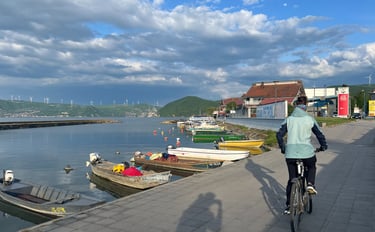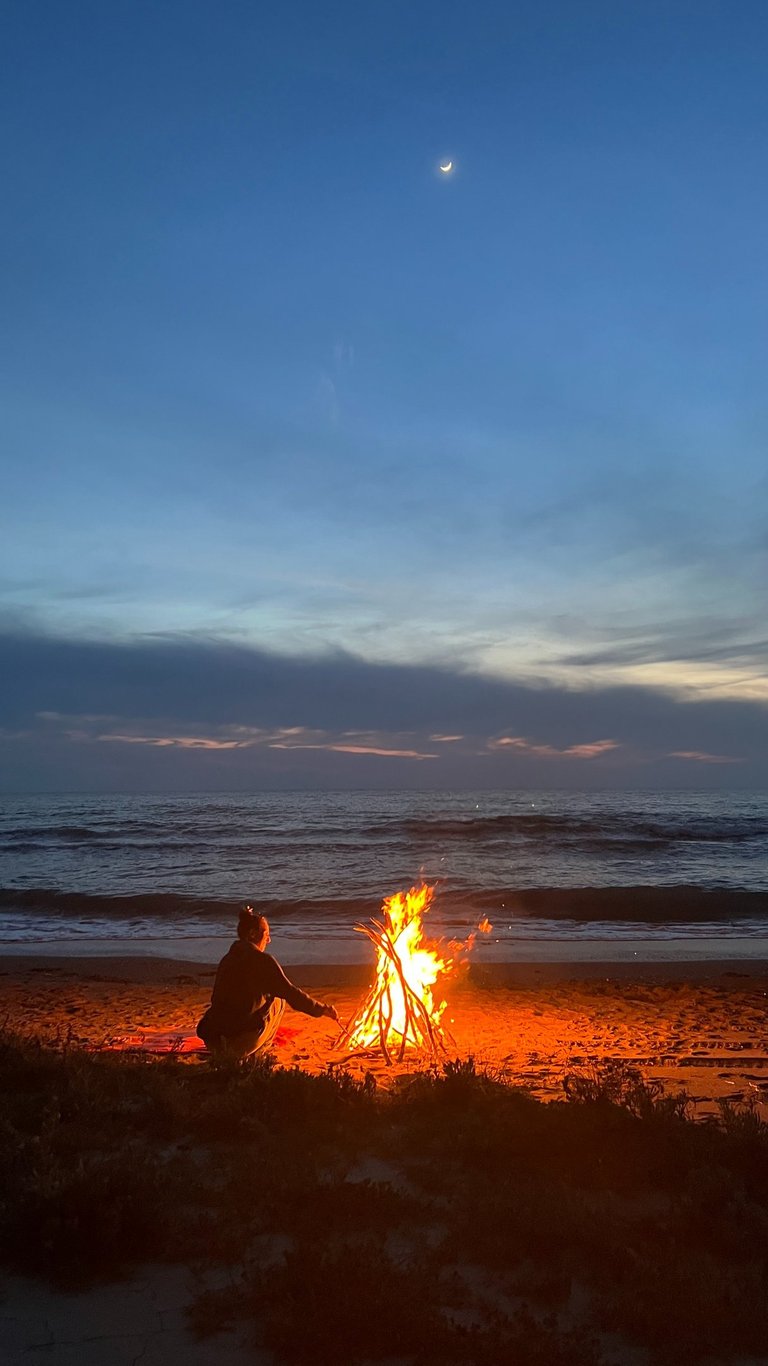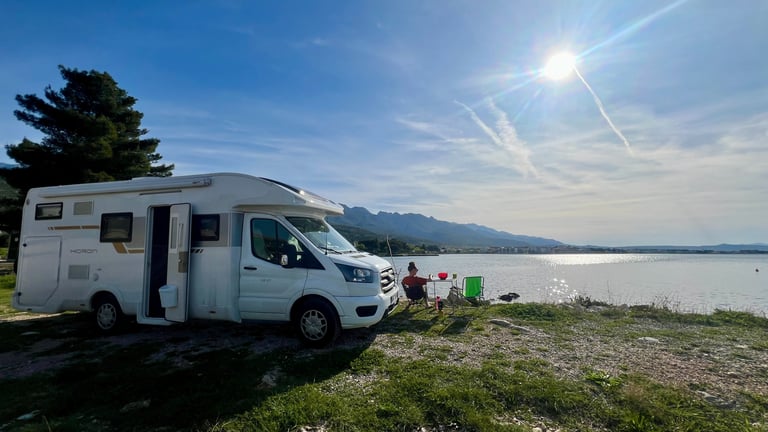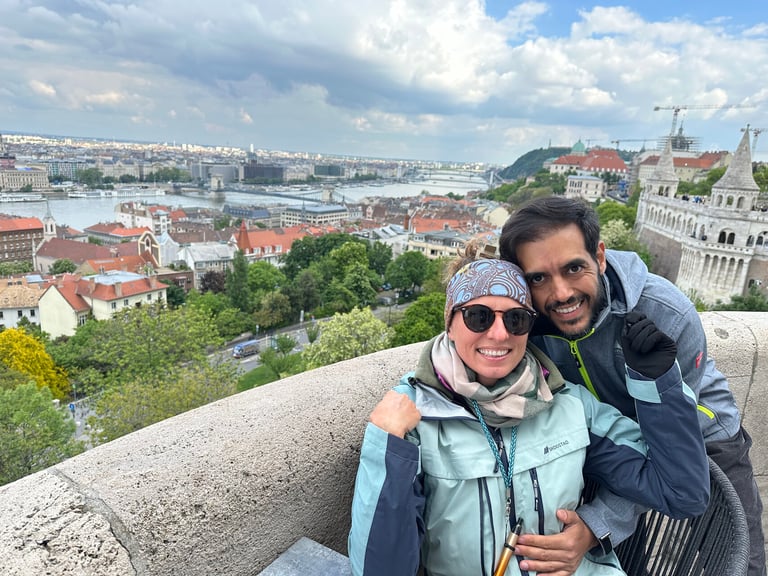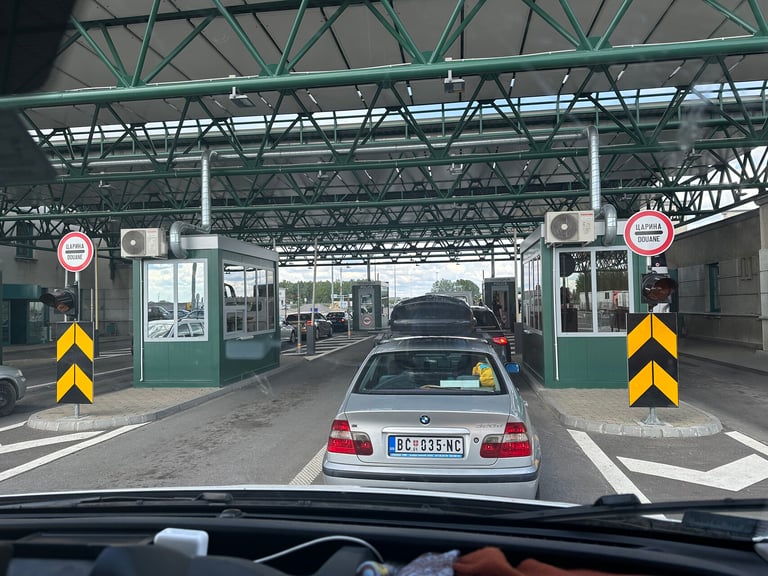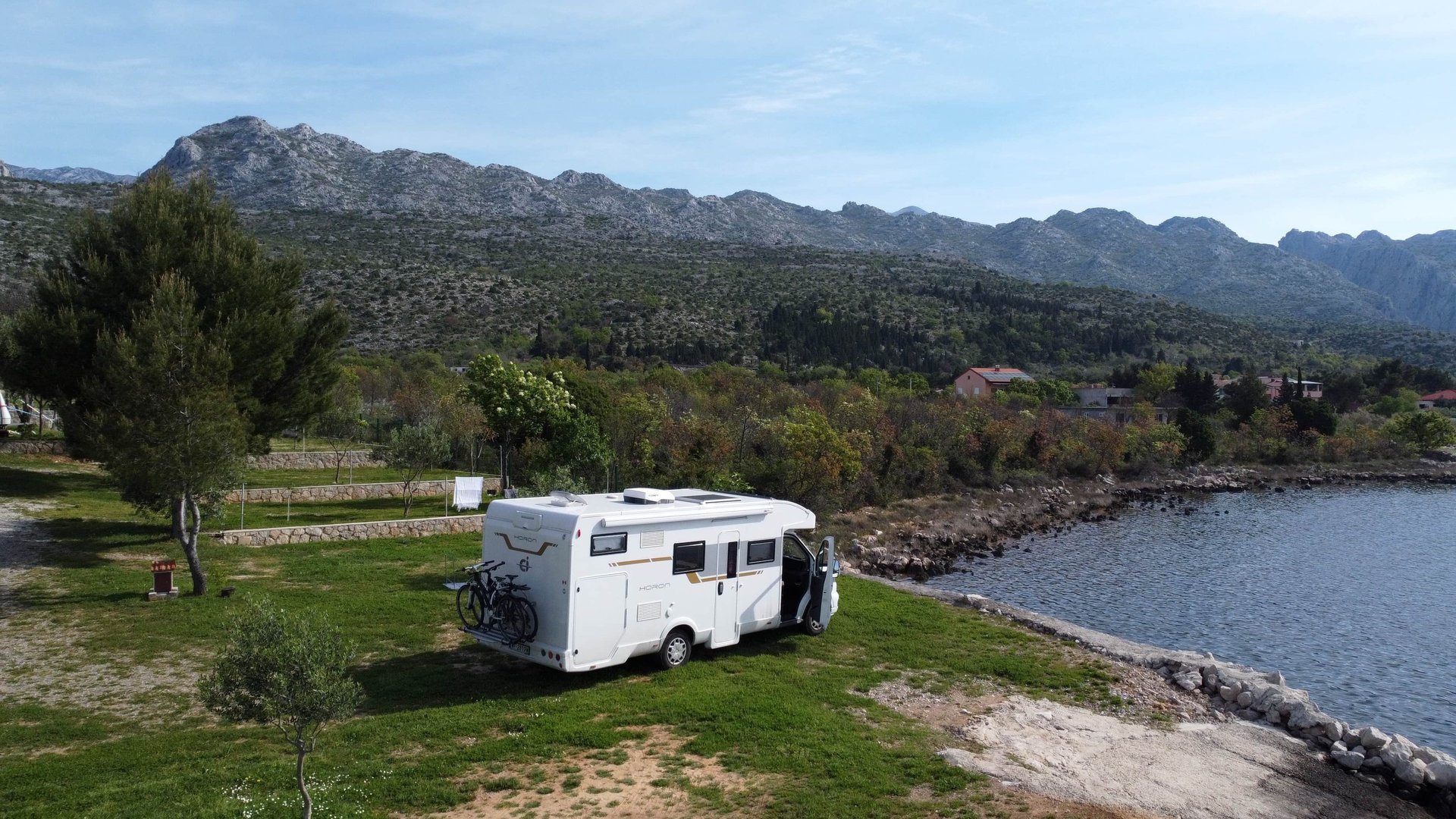
Camper Van Travel Guide
Detailed info about our camper van trip with expenses, camping spots, relationship tips and more.
CAMPER VAN TRAVEL GUIDE
During our 3 weeks camper van tour in Europe, Karolina wrote down so much information about our trip.
Destinations, distances, locations, fuel consumption, detailed expenses, and many more was written on the go.
In the sections below you will find two main subjects; our guide of what we learned from this incredible trip.
And the other subject is PDF files with so much details about all the mentioned above to helping you have an expanded vision of what is waiting if you decided to go for a camper van trip.
It is completely free of charge and the files are downloadable so you can keep it and go back to it whenever you need.
All what we ask for is your support, spreading the word and share us on social media, you can find below a link for donations as well :)
INSTAGRAM:
SOCIAL
YOUTUBE
Overview
Camping Spots:
In this interactive map below, you will see all the 19 locations where we spent our nights during the camper van adventure, most of the spots are free and few only are paid.
We also included notes and photos for most of the spots, such as price, city, location advantages and disadvantages.
For the paid campsites, we added the phone number and the website when available.
We used mainly apps like "park4night" and"StayFree" for wild sleeping spots, some places were recommended to us by family.
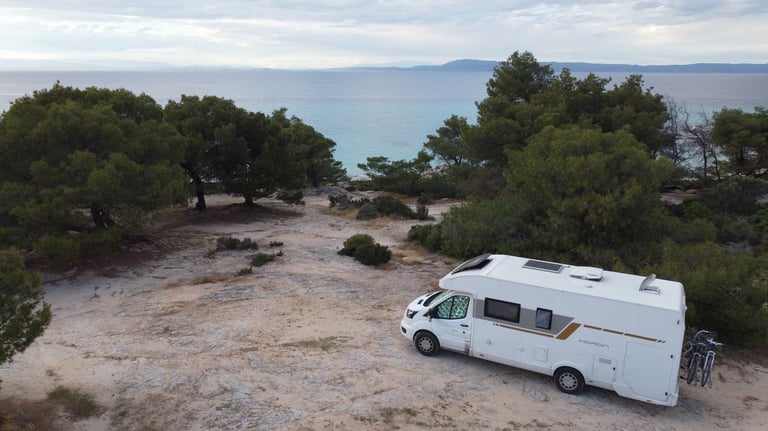

Expenses:
Lets start with the money we saved, the camper van rental, as we mentioned before, we got the camper van for FREE from our cousin, they own 2 camper vans and rent them, and they decided to give one just before the season to make our dream comes true!
Saying this means we already saved easily more than 1200 euros for renting a camper van.
Now we go to what we really spent during these three weeks around Europe.
We will sort out the expenses divided in categories from the highest to the lowest, with short description when needed:
1. FUEL: 792 €.
With driving for 5392 km's, comes this biggest spending of our budget. The most expensive rate for fuel was surprisingly in Albania as 1.88€ per litre. While the cheapest was in N.Macedonia as 1.29€ per litre.
Driving style: Most of the trip we where trying to drive economically, not too much pressure on the fuel pedal, but many times we had to overtake slow trucks, sometimes we had head wind which slowed us down so in compensation, more fuel consumption was presented.
It was also essential to choose which type of road we go through.
For example: sometimes we had two options, a highway with longer distance, or a shortcut through towns and villages.
On the highway, the fuel consumption would be less as it meant steady fuel pedal and less shifting gears.
while the shortcut meant more pedal fuel, more shifting gear, and more breaking as well.
The terrain also sometimes uphill for long time, which ment more fuel consumption as well. Its self explanatory we guess!
Its also important to mention that its very tempting to drive fast during the night on highways, especially when we felt tired and just wanted to get to our next destination.
When the highway is few hundreds of kilometres, if you go fast, the fuel consumption would go very high.
Our average speed on highway was around 100-110 km's\h. its not the best for fuel consumption, but we we were ready to spend a little bit more just to get to our destinations quick enough.
Try to avoid refills on motorway and close to borders as prices tend to be higher there.
Also it is worth to check on Google beforehand an average petrol price for a particular country.
Traveling Cost:
2. Toll Vignettes: 174 €.
The second highest amount we spent on traveling was the tolls.
In four countries only(Greece, Slovenia, Croatia, Serbia) we paid 123€ in total.
The system is simple, drive on the highway, then you will reach the tolls window and the employee will tell you how much to pay, its different based on the vehicle type and size. You can pay in cash or by credit cards.
In Slovenia and Austria we bought the vignettes online before crossing their borders.
3. Camp sites and car parks: 70 €.
We have to say that we spent the night in wild spots and away from cities, so we didn’t need to pay for parking or even campsites except few times.
It was only one night we spent in a car park in Croatia, and another night in Hungary. Each night cost 21€.
For parking our camper van, we only paid 3 times, one in a national park in Croatia 12€, one in Czech Republic Brno caves area 8€, and last in a Budapest city park 9€.
5. Ferry: 24 €.
During passing through Serbia, we had to use ferry to cross the bay, it was 10€, the same we did in Albania by crossing a river by the ferry and it was 14€.
4. Green card and Car insurance: 95 €.
We bought car insurance before leaving Poland for 45€.
The mistake we did was we didn’t buy online a green card for crossing North Macedonia, after you buy it, it takes one or two days to be ready.
As we didn’t have it and then reached the borders, we had to pay for the green card 50€.
It is always the best to buy in advance and check the options to get the cheapest possible price.
6. Other expenses: 72 €.
Driving for over than 5000 km's, means sooner or later you will get surprised with extra money to spent.
For example we had to get the camper van engine oil changed in Greece, which has costed us 20€.
Also we had to keep refilling blue water for the engine, to keep the engine smoke meeting the European regulations.
Shopping:
1. Grocery: 455 €.
For 3 weeks, we spent 455€ on grocery, which means, the daily average was around 21€. and we used to have breakfast, snacks, and dinner almost every single day.
We think we did pretty well saving with this part.
First we we did a big shopping in Poland, mainly things with long shelf time, such as cans, pasta, and snacks.
Then during the trip we used to buy fresh things every 2-3 days like vegetables, fruits, dairy products and eggs.
We also have to mention that going back to Poland after 3 weeks, we still had some extra food like cans.
2. Restaurants: 200 €.
Even buying Grocery for the whole trip, we still have eaten few times in restaurants.
Who can resist going to Greece and not try their cuisine! or even visiting Hungary without eating the famous Langos.
The list is long but you get the idea, in 21 days, we have eaten in restaurants 6 times, and of course few times having coffee in coffee houses just like that coffee we had in Croatia national park in the middle of the mountain.
The thing is that not every day we felt like cooking in our camper van kitchen, sometime we were tired after a long day of hiking, other times it was so hot to be inside the camper cooking.
But most important we kept our restaurants visits under control.
3. Gifts: 85 €.
Having family in Poland, we really wanted to buy some souvenirs for them as a thank you for their open arms welcoming us every time we visit Poland and or even our cousin giving us the camper van for free.
We kept the gifts simple, mainly bought from Greece, few fridge magnets, olive oil and some greek herbs.
4. Other expenses: 30 €.
In Poland and before starting our trip, we packed everything we needed, or at least thats what we thought!
We thinks its normal to forget things sometimes, specially if its not essential.
In Croatia we had to do small shopping in decathlon, we also had to visit the pharmacy for few simple things.
Attractions:
1. Thermal baths: 135 €.
At the final days of our trip, we were tired and not feeling that energetic and fresh, therefore we decide to treat ourselves with a nice relaxing time in Budapest in a thermal bath centre.
The entry fees were 62€ per person. We spent few hours there and it was really great decision just before driving back to Poland.
2. Cave in Brno: 37 €.
We visited a breathtaking cave in Brno, Czech Republic, it was really worth and it was a perfect start to our camper van trip.
3. Paklenica & Plitvicka Jezera : 32 €.
On top of the attractions we visited was the Paklenica National Park and Plitvicka Jezera(lakes park) in Croatia.
These two wonderful places were the best activity we did during our trip, and the best part is it wasnt expensive as it was off-season time!
4. Castle in Serbia: 13 €.
By the Serbian Romanian borders, we visited this castle and it has a beautiful view by the river there. We even tried Bow shooting like the ancient times just for 2 €.
5. Camper Van wash: 10 €.
After returning to Poland, we had a final attraction to visit, the car wash to clean the camper van before giving it back to our cousin.
It took us half an hour to clean it from the outside, while doing so we where talking about our good times in the last three weeks!
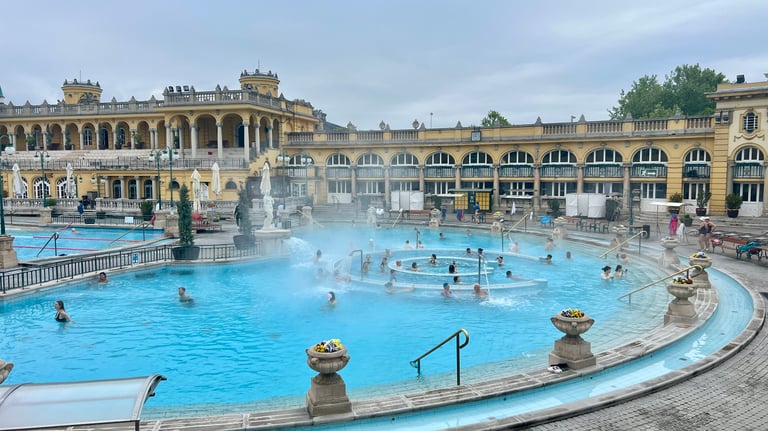

Pros and Cons:
Traveling by camper van has exploded in popularity, offering a unique blend of freedom and comfort.
However, like any mode of travel, it comes with its own set of advantages and disadvantages.
Here's a breakdown of the pros and cons to help you decide if camper van life is for you:
Pros of traveling by camper van:
2. Freedom and Flexibility:
This is arguably the biggest draw as you're not tied to hotel bookings or strict itineraries.
Wake up to a new view every day, change your plans In the blink of an eye, and explore locations that might be inaccessible with other forms of travel.
3. Comfort:
Unlike tent camping, a camper van provides a more comfortable and secure base.
You typically have a bed, a kitchen, and a bathroom, allowing you to maintain some level of routine and comfort wherever you go.
4. Closer to nature:
Camper vans allow you to immerse yourself more deeply in natural environments.
You can park in scenic overlooks, national parks, beaches and remote areas, enjoying sunrises, sunsets, and stargazing from your doorstep.
5. Spontaneity:
We hadn’t been to most of the countries we visited, which was a huge draw for us.
We wanted to explore new destinations and get a feel for each place for future travels.
We didn’t have an exhaustive itinerary, and we loved it that way.
We only had one fixed destination in mind: Halkidiki, Greece and everything else was fluid.
We drove with the weather as our main guide and let spontaneity lead the way.
As much as we wanted to see every famous site, we focused on getting a taste of each country, even if that meant skipping some well-known spots due to bad weather or last-minute changes of plans.
The beauty of camper travel is the flexibility, you can follow your instincts and change your mind on a whim.
6. Packing:
When you decide to travel by a camper van, you almost can pack anything you need and want.
And once your van is packed, you're pretty much ready to go.
No need to repeatedly pack and unpack suitcases at every new destination.
7. Pet friendly:
Many camper van owners find it much easier to travel with their pets, as you avoid the hassle and extra fees associated with pet-friendly hotels.
Cons of traveling by camper van:
1. Driving:
For us, Driving a large vehicle like the camper van for the first time, managing power systems, water tanks, and waste disposal took us some getting used to.
For some, Cleaning a camper van toilet is never an option!
1. Freedom and Flexibility:
While the initial investment in renting a camper van and its fuel consumption can be significant, you save on flights, accommodation, car rental and food costs, which can add up very quickly during extended trips.
In a camper van you save all the mentioned above, plus if your camper van can accommodate 4 people and you are traveling with another couple, this means the cost will go down massively.
2. parking:
While the freedom is great, finding legal and safe places to park overnight, especially in high season and urban areas or popular tourist spots, can be a challenge.
Wild camping isn't always permitted or safe.
3. Maintenance:
Like any vehicle, camper vans can break down.
Repairs can be costly and inconvenient when you're on the road.
4. Shower and Toilet:
While many vans have bathrooms, they are often small and have limited water capacity.
You may need to rely on public showers or campground facilities.
5. Accessibility:
Camper vans might be restricted from some narrow roads, city centers, or parking garages, limiting your accessibility to certain attractions.
6. Security:
Camper vans can be targets for theft, especially if left unattended in remote areas or unsecured locations.
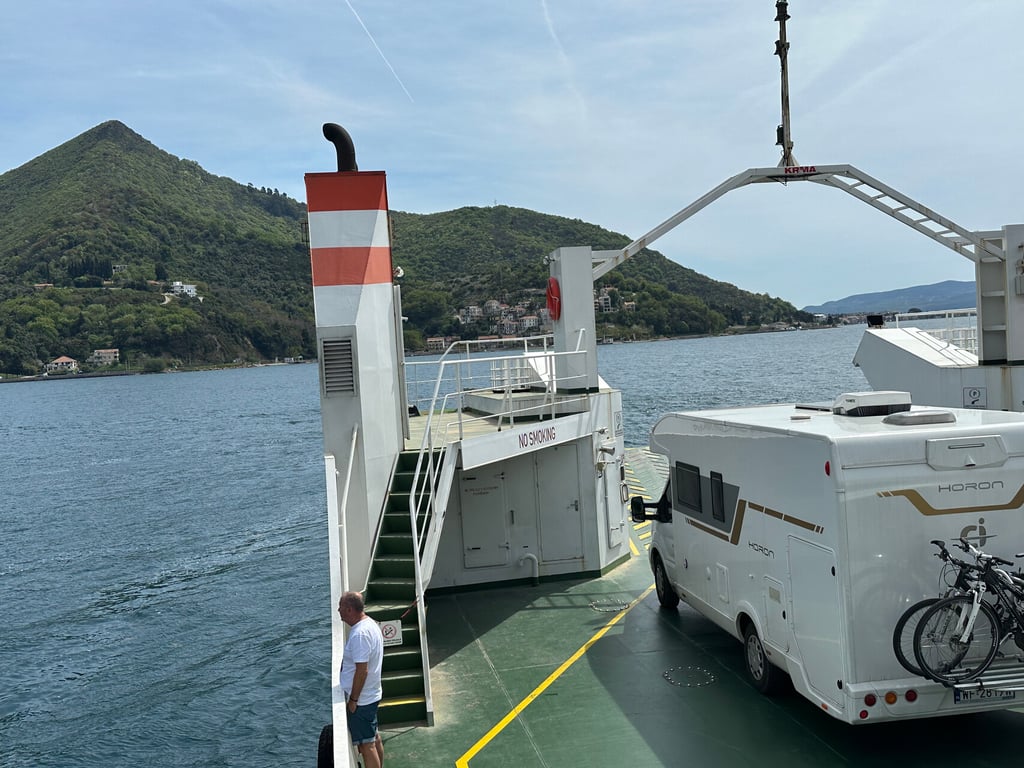

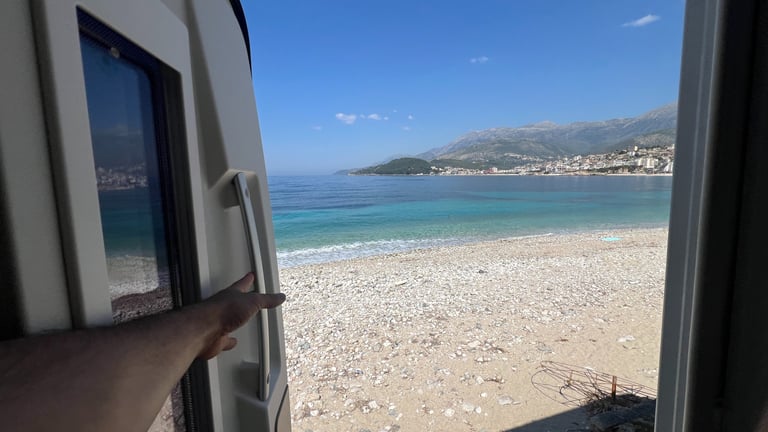

Lessons Learnt:
The moment we knew we were going to have a three weeks trip by camper van, our minds haven’t stopped thinking about, imagining all the places we would see.
And by time passing, we started checking countries, attractions and places to camp. This meant we started to have expectations.
During our trip, sometimes the expectations didn’t happen, other times the experiences we lived have passed our expectations. What we needed to do at these moments is to adapt specially the with negative times.
All of these situations led us to learn more about traveling in general and camper van in particular.
We will share with you the most important lessons we learned in this trip:
1. Weather changes are fine:
If weather changes last minute to the worse, that is fine, it happens.
Our plan was to visit Slovenia in the first few days of the trip, but the weather got really bad, so what did we do?
We simply started looking for another country with a better weather to drive to.
And guess what?! some times plans change for the better.
we had the most wonderful time during our trip in Croatia!
2. Off season sometimes is better:
One of the best parts of our trip was doing it in the low season.
Traveling with a camper during peak tourist times can be a nightmare — crowded campsites, limited parking, and high costs. In contrast.
The off-season gave us the freedom to park on beaches, sleep in serene wild spots, and explore uncrowded areas without any pressure.
In countries like Croatia, staying on campsites during high season is almost mandatory.
But during the low season, we often had entire areas to ourselves.
Most parking meters were even covered, so we didn’t have to worry about additional charges.
This made for a stress-free journey, where the world felt like it was ours to explore.
Plus, since we weren’t spending a fortune on accommodation, we could splurge on experiences that mattered.
3. DO NOT always trust google maps:
Google maps does not always show correct time and routes, and it doesnt have the option to choose that you are driving a camper van.
. We had few situations where the app was completely wrong, one of them was when it showed me us we need to go through a tunnel that was is lower than our camper van!
And it happened again in Warsaw Poland on our way back home.
In Montenegro, Google map is not very reliable, we followed the route and we got stuck in a steep uphill and damaged the side of the vehicle.
And in Albania there are no postal codes which makes it a bit hard to find an exact addresses.
4. Check highway tolls:
When planning to travel through multiple countries it is worth checking tolls options/VIGNETTE in advance.
In some countries like in Slovenia there are no one day vignettes available, the shortest one available is 7 day ticket for 32 Euros.
For Hungary or Slovakia on the other hand it is cheaper to buy vignette in advance for a way back as well.
On that note it is worth to mention that in Albania highways is still free, and in Montenegro there is no motorways.
5. Internet connection:
Keep an eye on your allowance, especially when going to more remote places make sure you have enough internet.
Even few kilometers from a border it might already pick up network from neighbouring country.
It happened to us while using polish internet allowance in Croatia which is EU country, our phone picked up signal from Montenegro which is not in EU from a Monument view point, costing us additional charge for outside of EU internet usage.
6. Petrol refills management:
Sometimes we waited too long looking for cheapest price and not checking how close to border or highway we were, or we would drive until we had to refill and we ended up paying more or we made wrong assumptions like one with Albania.
Country itself is very cheap, yet petrol turned out the most expensive from all the countries we visited.
7. Sightseeing:
We have not realised how crowded cities could be, and with a big vehicle like a camper van it is a big hustle.
We have not looked for a carpark in advance when we decide to go to Thessaloniki city in Greece, and while driving through packed city we couldn’t find a place to stop so we left, wasting 1.5 hour of extra travel for nothing!
8. Borders crossing:
Some countries may have different border crossing points depends on the vehicle type you drive.
For example in Serbian Hungarian borders, there are two points, one for normal vehicles, another for big vehicles like trucks and camper vans.
We didnt know this in advance and we waisted one hour waiting by the wront border point (Horgos 2 Border Crossing) as the gate too low for camper to go through.
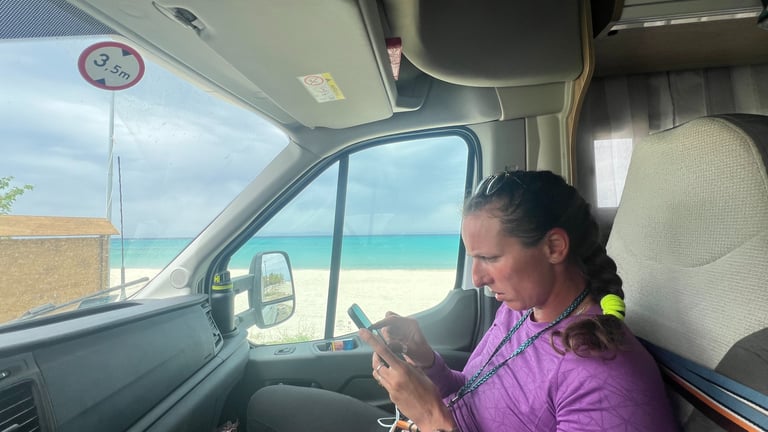

Relationship tips:
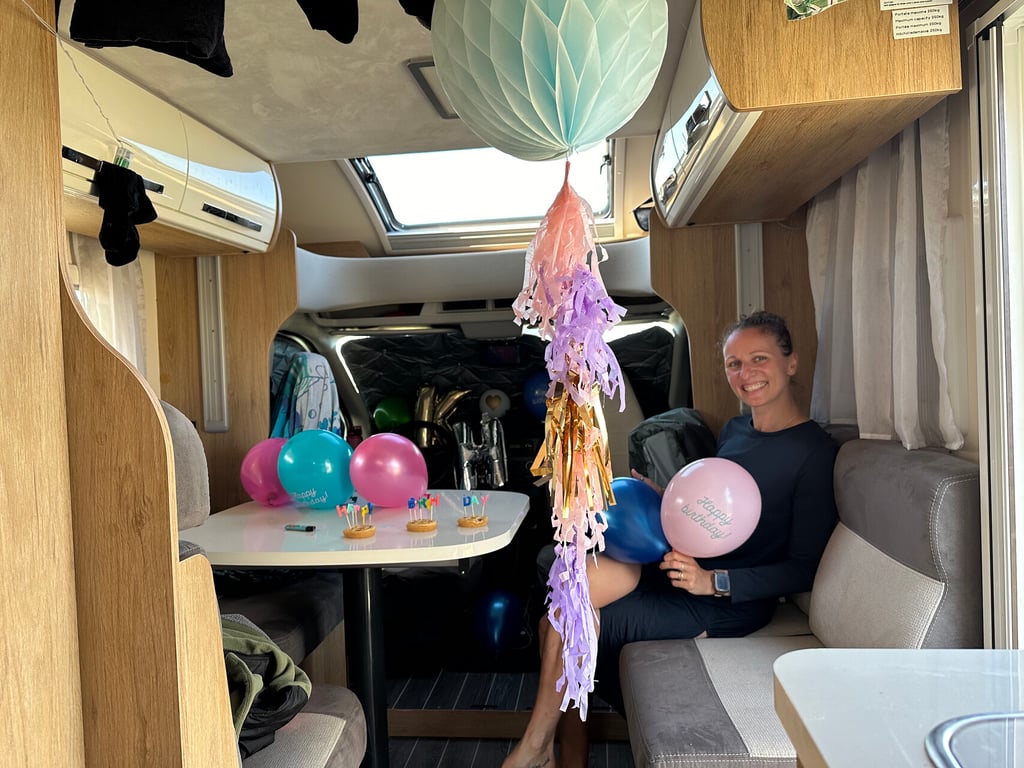

1. Task orientation:
Being on the road with no plan means that you need to make it as you go, that helps couples to focus on the task at hand and ignore unimportant details.
Couples in ‘normal’ living conditions tend to bicker about but here you need to find your next destination, place for the night, pick a perfect spot for the meal etc and all accompanied with beautiful views which take your breath away and make you so positively charged, you have no reasons to complain.
In our case Hamza was the one driving, which was the hard part. Needing to be focused on the road for long hours, especially on unknown routes and during the night, you must be super alert at all times.
I was sitting beside him relaxed, taking photos and videos at majority of the time. My only task was to look online for good spots for the night and explore our surroundings for interesting places to visit.
I also took a joy in feeding my driver with sandwiches and snacks. And every time we arrived to our new destination we had a sense of achieving common goal and feeling proud for the place we had found.
2. Unexpected situations:
When an unexpected issue occurs and catches you off guard and distress, the first thing that kicks in is teamwork.
It is us against It, whatever it might be.
In critical and stressful situations caused by outer factors it is almost natural to join forces and work together to overcome and rectify adversities.
We encountered this kind of situations on few occasions, One of the most nerve wracking moments was when we were mislead by Google Maps in Montenegro.
This moment was so unexpected and very surprising for me. For the first time in my life I did not manage to stay composed under pressure, but also it was a milestone of our relationship. In that exact moment I realised that there is someone I can really rely on who will always have my back at my worse and that we compliment each other.
It is the most important realisation of all in relationship, to have the certainty that when one of you is weak the other will compensate for it and the other way around.
3. Confined space:
Although I am not trying to say that all was rainbows and butterflies. Living in confined space can cause all sorts of disputes and disagreements.
For us it was the most vital to organise space around us upon departure and it helped us to avoid a lot of hassle regarding that matter.
We struggled with other things like misplacing things and ‘fighting’ over limited space for our belongings.
Also kitchen is small and sometimes manoeuvring around can be challenging causing tension and arguments.
4. Driving big vehicle:
Driving a camper van is very different than a passengers car.
It is shaky, loud and definitely slower as well. but for us the biggest issue was driving through mountains, uphill, dirt roads, in remote areas and parking.
Sometimes we had a different vision to what is the best solution and that caused some disagreements.
In small spaces I had to help Hamza with navigating camper from outside and communication in this moments was difficult at times, there was a lot of misconceptions and misunderstandings which led sometimes to an argument.
Also I was often scared that we will roll down the hill when camper was struggling to go up.
One time I insisted to stop half way through the elevation to take a photo of the view and after stopping we struggled to continue upwards. That was a scary and stressful moment for both of us.
5. Overcoming difficulties:
Fortunately every hard moment was followed by a new beautiful scenery ahead and having survived the crisis made us both happy and celebrating the victory.
In such surroundings no problem last long and even heated moments pass quickly. The anticipation of new places ahead helps greatly to put it all behind.
6. Spending time together:
When you travel by camper van which becomes your new home with limited space you do not want to sit in.
Every day you arrive to a new place and you want to go exploring. We packed with us bikes, electric scooter, paddle board and even climbing gear, so we had plenty of things to do.
Walking together, hiking and riding bikes among beautiful nature, witnessing sunsets and sun rises gives an opportunity to spend a quality time together and space to deep conversations.
We normally spend a lot of time together, but during ‘normal’ life when we both have to take care of daily duties like shopping, cleaning, cooking and working.
There is not much time left for us as a couple. When you take all this things out of equation and you live in harmony withe the rhythm of nature, you gain what is the most valuable for relationship…. Time.
This journey with all ups and downs definitely strengthened our bond and gave us insight to better understand each other.
7. Building relationship:
These new circumstances we put ourselves in gave us a different angle and perspective regarding ourselves and our relationship.
I personally think that for a couple it is very crucial to face all type of situations in order to get to know each other inside out.
Only then you can say that it is for better and for worse. It is a kind of a test and if you come OK on the other end then you can go through anything together.
We not only overcame all challenges but we got stronger, better and more united.
Summary:
Is a Camper van trip for You?
At the end of the day, a camper tour through Europe is an incredibly rewarding way to travel, but it’s not for everyone.
It’s a form of travel that requires a spirit of adventure, flexibility, and a certain amount of patience. You’ll deal with the occasional inconvenience and face moments of uncertainty, but the freedom and experiences that come with it are unmatched.
If you’re looking for an adventure where you can truly get off the beaten path, take each day as it comes, and have the flexibility to decide where you want to go next, then a camper tour could be the perfect way to explore Europe.
As a summary, renting a camper van is for you if:
You value flexibility and spontaneity: You love the idea of changing your view daily, exploring locations, and having your "home" with you wherever you go, without being tied to hotel bookings.
You want to save on costs: While the rental fee exists, you cut out hotel expenses, car rental and flights and can save by cooking most of your meals in the van.
You prefer a mix of comfort and adventure: It's a step up from tent camping, offering a bed, basic kitchen, and often a bathroom, providing more comfort and security while still immersing you in nature.
You're traveling with pets or want to bring more gear: It offers more freedom and space for pets like dogs and adventure equipment compared to traditional car travel.
And renting a camper van is likely NOT for you if:
You're on a very tight budget: While it saves on hotels, car rental and flights. Rental fees can be high, especially in peak season, and hidden costs like mileage limits, insurance, and cleaning fees can quickly add up.
You dislike planning and tracking expenses: You'll need to budget carefully for rental fees, fuel, campsites, and potential extra charges.
You crave spaciousness and luxury: Camper vans are compact living spaces. If you need ample room, private bathrooms, or resort-style amenities, you might feel cramped and miss traditional hotel comforts.
You're not comfortable with vehicle basics or problem-solving: While rentals are maintained, you'll still be responsible for managing water, waste, and sometimes minor troubleshooting.
You prefer urban exploration over nature: Large vans can be challenging to drive and park in cities, limiting your access to downtown areas and making city sightseeing cumbersome.
You expect seamless spontaneity without prior booking: Popular vans get booked quickly, especially for prime dates, meaning you often need to plan and reserve well in advance.
You're looking for extreme off-roading adventures: Standard rental camper vans are typically not built for rugged terrain and often come with mileage restrictions on unpaved roads.
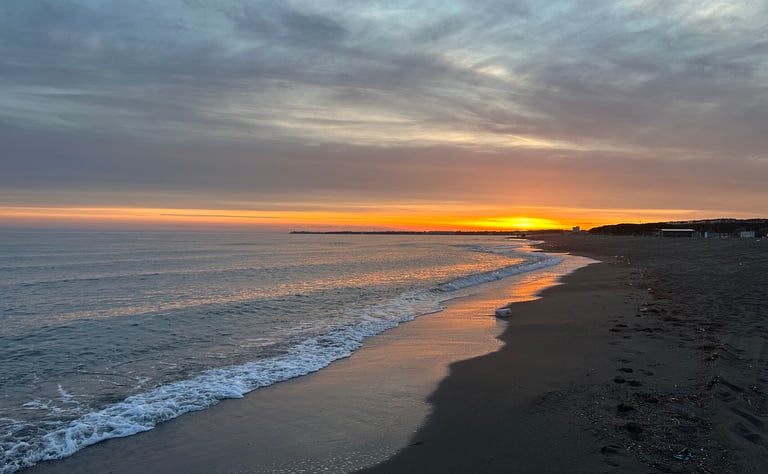

THIS BLOG IS SPONSORED BY YOU AND OTHER TRAVELERS!
THANK YOU ᥫ᭡.
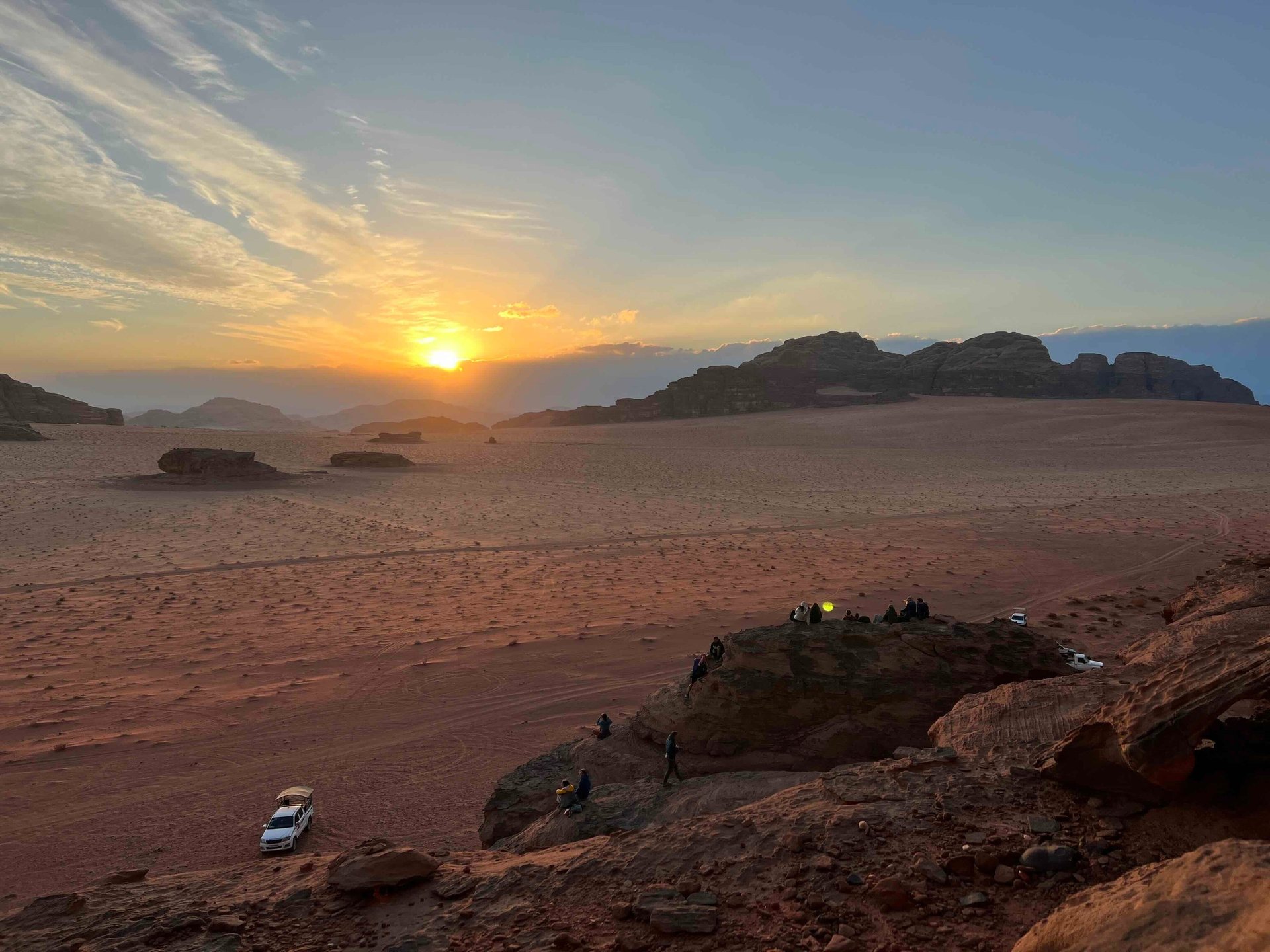
Feel free to contact us to help you organize your trip to Jordan and have unforgettable memories!

